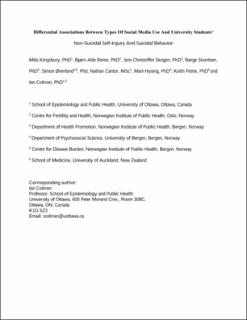| dc.contributor.author | Kingsbury, Mila | |
| dc.contributor.author | Reme, Bjørn-Atle | |
| dc.contributor.author | Skogen, Jens Christoffer | |
| dc.contributor.author | Sivertsen, Børge | |
| dc.contributor.author | Øverland, Simon Nygaard | |
| dc.contributor.author | Cantor, Nathan | |
| dc.contributor.author | Hysing, Mari | |
| dc.contributor.author | Petrie, Keith | |
| dc.contributor.author | Colman, Ian | |
| dc.date.accessioned | 2021-02-02T13:15:24Z | |
| dc.date.available | 2021-02-02T13:15:24Z | |
| dc.date.created | 2020-11-30T13:17:38Z | |
| dc.date.issued | 2020 | |
| dc.identifier.citation | Computers in Human Behavior. 2020, 1-6. | en_US |
| dc.identifier.issn | 0747-5632 | |
| dc.identifier.uri | https://hdl.handle.net/11250/2725836 | |
| dc.description.abstract | Objective
To examine differential associations between types of social media use and non-suicidal self-injury (NSSI) and suicidal behaviors.
Methods
Participants were N = 40,065 Norwegian college and university students, age 18–25, from the 2018 Students' Health and Wellbeing (SHoT) study. Students reported on their use of social media for seven specific activities, which we categorized into active and passive non-social use, passive social use, active public social, and active private social use. We also considered students' tendency for negative social comparisons on social media. Outcomes were past-year NSSI, NSSI ideation, suicidal ideation, and suicide attempt. Covariates were age, gender, total daily screen time and financial stress.
Results
Results of multiple logistic regression revealed differential associations between types of social media use and outcomes. Notably, active social private use (e.g., messaging friends) was associated with decreased odds of all outcomes, whereas active social public use (e.g., status updates) was associated with increased odds of NSSI ideation, NSSI, and suicide attempt. Social comparison was associated with increased odds of all outcomes.
Conclusion
Our results suggest that specific types of social media use are differentially associated with NSSI and suicidal outcomes among university students. | en_US |
| dc.language.iso | eng | en_US |
| dc.publisher | Elsevier | en_US |
| dc.rights | Attribution-NonCommercial-NoDerivatives 4.0 Internasjonal | * |
| dc.rights.uri | http://creativecommons.org/licenses/by-nc-nd/4.0/deed.no | * |
| dc.title | Differential associations between types of social media use and university students' non-suicidal self-injury and suicidal behavior | en_US |
| dc.type | Peer reviewed | en_US |
| dc.type | Journal article | en_US |
| dc.description.version | acceptedVersion | en_US |
| dc.source.pagenumber | 1-6 | en_US |
| dc.source.journal | Computers in Human Behavior | en_US |
| dc.identifier.doi | 10.1016/j.chb.2020.106614 | |
| dc.identifier.cristin | 1854144 | |
| dc.relation.project | Norges forskningsråd: 262700 | en_US |
| dc.description.localcode | "© 2020. This is the authors’ accepted and refereed manuscript to the article. Locked until 2.11.2022 due to copyright restrictions. This manuscript version is made available under the CC-BY-NC-ND 4.0 license http://creativecommons.org/licenses/by-nc-nd/4.0/ " | en_US |
| cristin.ispublished | true | |
| cristin.fulltext | postprint | |
| cristin.qualitycode | 1 | |

